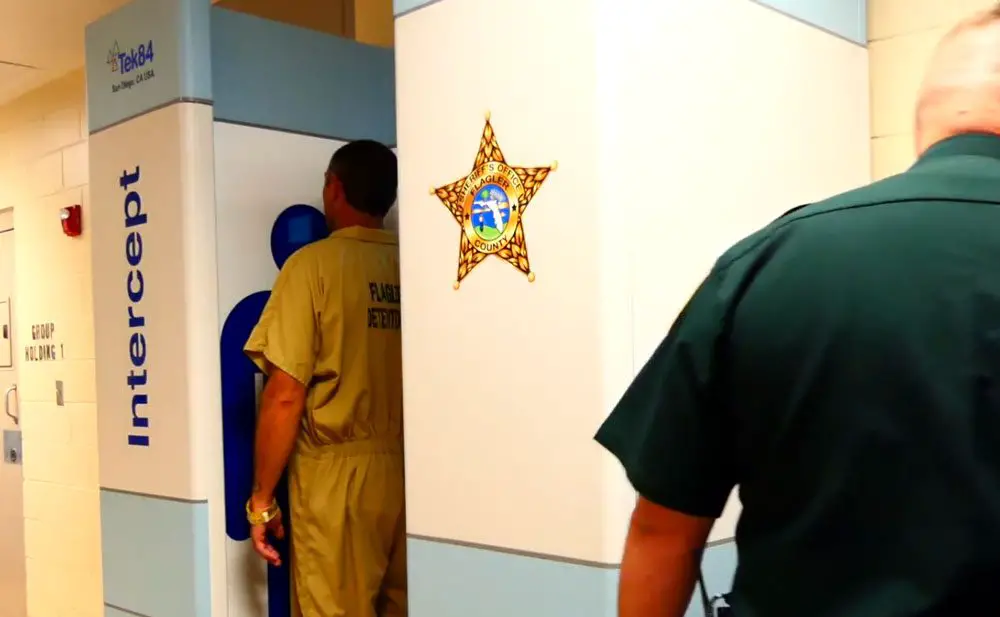
Some of the contraband individuals booked at the Flagler County jail have tried to bring in includes cell phones, drugs, pocket knives, razors, razor blades, a screw driver, cigarettes, cigarette lighters, and “a few syringes,” as a sheriff’s spokesperson described it.
The addition of a $149,000 full-body scanner to the booking process is intended to reduce the chance that any contraband makes it past the booking process, but also to reduce the time it takes to search a person getting booked in or returning from a trip to the courthouse, the hospital or a work detail. The scanner is produced by the same company that has provided hundreds of full-body scanners to airports around the country (where everyone is an inmate while in air transport’s custody). The cost of the machine included installation and training.
“Our jail is the first detention facility in the state of Florida to have the Tek84 Intercept Body Scanner,” Sheriff Rick Staly says in a video illustrating the scanner. The agency issued the video this morning with an announcement about the addition.
But it isn’t the first county jail in the state to have a full-body scanner: the technology is increasingly popular in jails and prisons, with different manufactures providing different models. The Charlotte County jail has had a full-body scanner for about a year (and has intercepted about 70 items since, including a syringe, a lighter and a crack pipe). The Santa Rosa County jail has had one a year and a half. Miami-Dade installed full-body scanners last summer. The Pasco County jail started using one in 2011, Sarasota County started using one in 2013, and Orange County, which paid $169,000 for its scanner, installed one in 2016. Pinellas and St. Lucie counties’ jails also have full-body scanners.
Florida prisons all have X-ray scanners for all visitor and staff entrances. The manufacturer of Flagler’s scanner says in its specs that “more than 500 such body scanners are now installed in U.S. correctional facilities, manufactured by companies in Belarus, EU [the European Union], Brazil and China.” Tek84 is based in Poway, Calif. It started as Spectrum San Diego in 1998.
“The scanner is much less intrusive than the comparable strip search used by most jails today.” A strip search can take about 15 minutes. The scan takes a few seconds. The scanner is said to be safe, relative to X-rays: a spokesperson said it would take 400 scans to generate the sort of radiation a single X-ray would. The Tek84 technology uses what’s called the backscatter system, which uses low doses of X-rays. Its health threats have been deemed negligible.
But for now, all inmates booked on a felony charge will still be scanned and strip-searched, a sheriff’s spokesperson said. Inmates booked on misdemeanor charges will merely be scanned: Florida law prohibits the strip-searching of individuals booked on misdemeanors only.
“In an environment like a jail,” Staly said, “detention deputies rely on search procedures to ensure the safety of our inmates and staff.” The scanner’s addition, he said, would improve safety and security.
Because of the scanner’s high resolution, female detention deputies will be scanning female inmates, and male detention deputies will be scanning male inmates. It appears the scanner has already detected contraband. Last week, a deputy was scanning an incoming female inmate when she noticed an object on the scan near the inmate’s breast area, according to the sheriff’s release. After the inmate denied having any contraband, the deputy moved the inmate to the strip search room. During the search, a metal object hit the floor. It was a grinder used to grind marijuana, with traces of pot inside. The inmate got an additional charge of Introduction of Contraband into a Detention Facility, a third-degree felony. Another inmate told deputies just before entering the jail that he was concealing a bag of heroin in his butt. A sheriff’s spokesperson said the scanner is designed to detect bags of drugs.
The agency has been increasing its reliance on technology, live technology especially, from body cams to license-plate scanners to the ongoing addition of real-time video from numerous Palm Coast traffic intersections to, very soon, the addition of a real-time crime center. Some of the technology enters into gray areas of the state’s public-record and record-maintenance laws.
Asked where the sheriff’s office found the money to pay for the scanner, Chief Mark Strobridge said: “The budget.” He added: “All those things are planned well in advance. That was out of last year’s budget. Our new budget started Oct. 1.” Strobridge is currently overseeing the jail in place of Steve Cole, who retired. The agency is searching for a permanent replacement for Cole.





























Clark Griswold says
A much better idea what have been to put the scanner machines in our schools!!!
Just like Disney, Airports, and cruise ships.
Doing a pat down on a single inmate that takes 15 minutes to do is no big deal. Scanning 1500 kids everyday is! Install the scanners in all of our schools!
Clark Griswold says
Why not put the scanners in all of our schools??
Disney, Airports and cruise ships all use them!
facebook says
The forbidden individuals are caught for bringing cell phones, cigarettes, pocket knife, razor, drugs, etc in the Flagler jail. So the authority of the jail decides to bring a full-body scanner, which will scan the individual’s body properly, and it will take the least time.